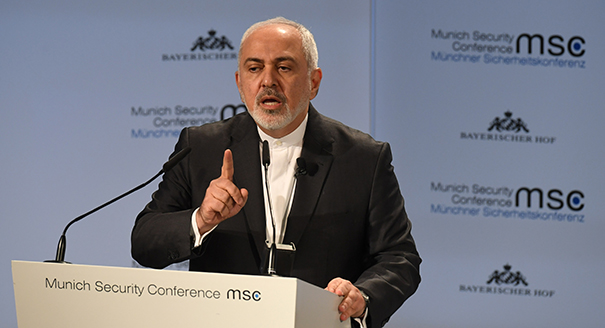On Monday, Iran’s foreign minister, Mohammed Javad Zarif, resigned through his Instagram account. To discuss the resignation, Diwan spoke to Natasha Schmidt, English editor for IranWire.com. Schmidt has worked in global human rights journalism and advocacy for close to 20 years. Prior to joining IranWire, she was deputy editor and acting editor at Index on Censorship, and worked as part of a coalition of organizations campaigning for free speech in Azerbaijan.
Michael Young: Why did Iran’s foreign minister Javad Zarif resign?
Natasha Schmidt: Speculation about Zarif’s resignation is ongoing, and so far there has been no official comment from Tehran or the desk of President Hassan Rouhani. However, Syrian President Bashar al-Assad’s unexpected visit to Iran yesterday—the first time he has done so since the start of the Syrian civil war—was seen by many as the final straw. Assad met with the president, the supreme leader, and Quds Force commander Qassem Soleimani, but Zarif was sidelined.
MY: What was the significance of Zarif’s resigning through his Instagram account?
NS: The fact that Zarif made his announcement via Instagram suggests that he wanted to reach the Iranian people directly and not have to go through Iran’s official media outlets. His rather emotional language—he apologized for “shortcomings” during his time as foreign minister—also supported this, showing he wanted to deliver the news on his own terms.
MY: Does Zarif’s resignation in any way affect the balance of power within Iran’s leadership class?
NS: Zarif’s departure comes after years of pressure from Iran’s hardliner politicians, as well as a period of political exile during the years of Mahmoud Ahmadinejad’s presidency. Zarif’s noticeable exclusion from the meetings with Bashar al-Assad followed on from reports that he was visibly frustrated at the recent Munich Security Conference. Many, including IranWire director Maziar Bahari, have acknowledged that Zarif had been one of the strongest advocates for engagement with the West, and he is known for being a key architect of the nuclear deal signed with Iran, from which the United States withdrew last May.
His role as a poster boy for this more open diplomacy had made him a target for Iran’s most conservative and hardline elements, and his resignation probably signals a final, reluctant admission that this sort of diplomacy will never be prominent in Iran’s foreign policy. Despite a majority of parliamentarians appealing to Rouhani not to accept his resignation, Zarif’s exit most likely means a shift back toward the insular inclinations of the hardliners’ agenda, and a strengthening of the power of Iran’s political and military elite, who continue to benefit financially while the rest of the country struggles to make ends meet.






